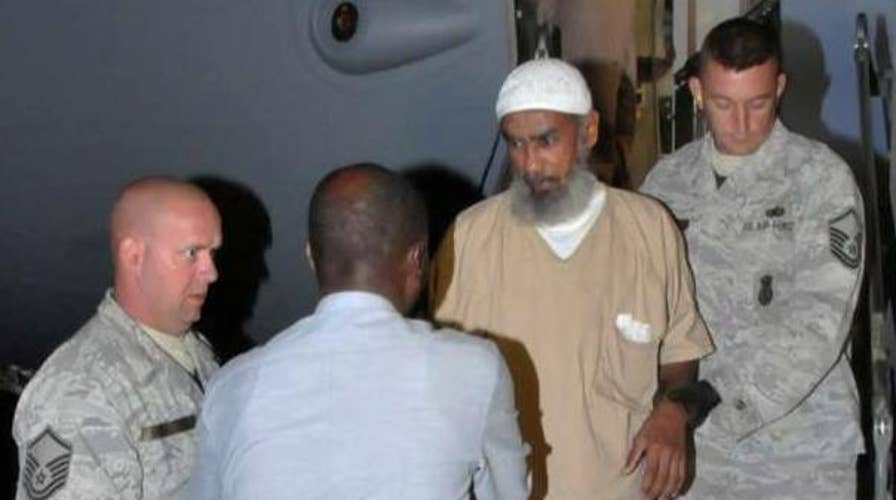Former Gitmo detainee now Al Qaeda commander in Yemen
Catherine Herridge reports from Washington, D.C.
A hardened Al Qaeda fighter who served as Usama bin Laden's jack-of-all-trades before spending a decade at Guantanamo Bay made a military prosecutor's prophecy come true when he resurfaced on the field of battle in Yemen, where he is one of the terror group's top leaders.
Ibrahim al-Qosi, a Sudanese native who once served as Usama bin Laden's cook, chauffeur and bookkeeper, appears in the latest video released this week by Al Qaeda in the Arabian Peninsula (AQAP), some three years after he was released from the U.S. military facility. The 55-year-old Al-Qosi is one of the Al Qaeda chapter's top men, according to the Foundation For Defense of Democracies' Long War Journal blog.
"One of the main reasons the United States was willing to return him to Sudan was the U.S. confidence in the government of Sudan’s program and its confidence that Mr. al-Qosi would not represent any kind of threat to the United States," his attorney, Paul Reichler, said in July, 2012, when Al-Qosi was freed. "If they had considered him a threat, they would not have released him.”
“Detainee is an admitted veteran jihadist with combat experience beginning in 1990 and it is assessed he would engage in hostilities against U.S. forces, if released.”
Al-Qosi was believed to have been with Bin Laden at Tora Bora in Afghanistan in late 2001, when the U.S. narrowly missed taking out the terrorist kingpin and his entourage. He was one of the so-called "Dirty 30" the U.S. hotly pursued in the aftermath of 9/11, and was nabbed in Pakistan in 2002. Military prosecutors said Al-Qosi became close to Bin Laden while the Al Qaeda founder lived in Sudan, prior to his moving operations to Afghanistan.
In a leaked, 2007 Joint Task Force Guantanamo threat assessment, U.S. intelligence analysts described Al-Qosi as a “high” risk to the U.S. and its allies.
“Detainee is an admitted veteran jihadist with combat experience beginning in 1990 and it is assessed he would engage in hostilities against U.S. forces, if released,” the assessment stated.
In the video from Yeman, entitled "Guardians of Sharia," Al-Qosi and other AQAP commanders are shown discussing the terror group's policy of encouraging attacks against the West by individuals and small cells. The video also emphasizes the importance of following the teachings of experienced terror ideologues -- a likely reference to ISIS, whose rise over the past 18 months has overshadowed Al Qaeda's long-running terror campaign.
White House spokesman Josh Earnest said the White House is aware of the report but could not yet confirm it.
"Obviously, any report about a former GitMo detainee re-engaging in the fight would be source of significant concern, something that we would take quite seriously," Earnest said at Thursday's daily press briefing. "Based on what we know so far, more than 90 percent of those transferred from Guantanamo Bay have not re-engaged in the fight. But we are certainly paying close attention, even if we find unconfirmed reports about those who may have."
The Pentagon issued a similar statement, saying it takes "any incidence of re-engagement very seriously."
Neither Al-Qosi nor any of the other hardcore Guantanamo Bay detainees should have been freed, said former federal prosecutor Andrew McCarthy, who put the Blind Sheik in prison following the 1993 attack on the World Trade Center.
"The jihadists have been held at Gitmo because they are a threat to the United States and their detention is perfectly lawful under the laws of war," McCarthy said. "Releasing them is irresponsible. It is sadly ironic that President Obama has no qualms about killing jihadists with drone strikes but finds merely detaining them intolerable."
Al-Qosi, who first moved to Afghanistan in 1996, was among the first prisoners taken to the Guantanamo, the hastily arranged detention center to hold men suspected of ties to Al Qaeda and the Taliban after the U.S.-led invasion of Afghanistan in 2001. He is also known by the nom de guerre Sheikh Khubayb al Sudani.
In July 2010, Al-Qosi struck a deal with U.S. military prosecutors, pleading guilty to providing material support to terrorism and conspiracy in exchange for a 14-year sentence that would be shortened to two years from his conviction. The deal spared him the possibility of a much longer sentence.
Al-Qosi was never accused of any specific acts of violence. He admitted only to working as a cook and helping to gather supplies for a militant camp. At the time of his release, his lawyer said Al-Qosi merely bin Laden as part of an entourage but was never a member of the terrorist leader's inner circle.
Prosecutors at his military tribunal argued that Al Qaeda could not have operated without the support of people like Al-Qosi and that such assistance amounted to war crimes.
Al-Qosi’s appearance marks the first time he has starred in jihadist propaganda since he left Guantanamo. His personal relationship with bin Laden and time in American detention make him an especially high-profile spokesman.

